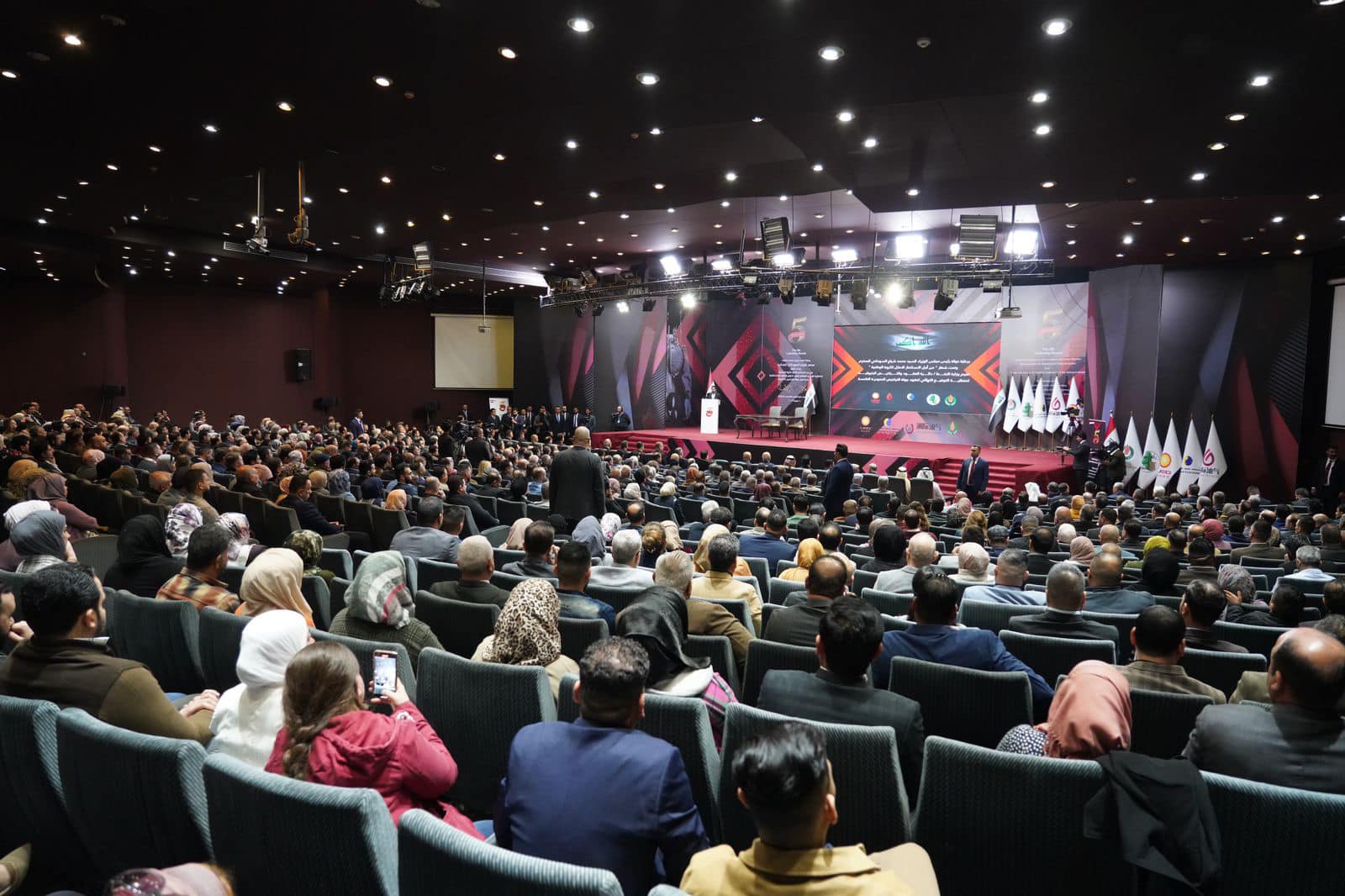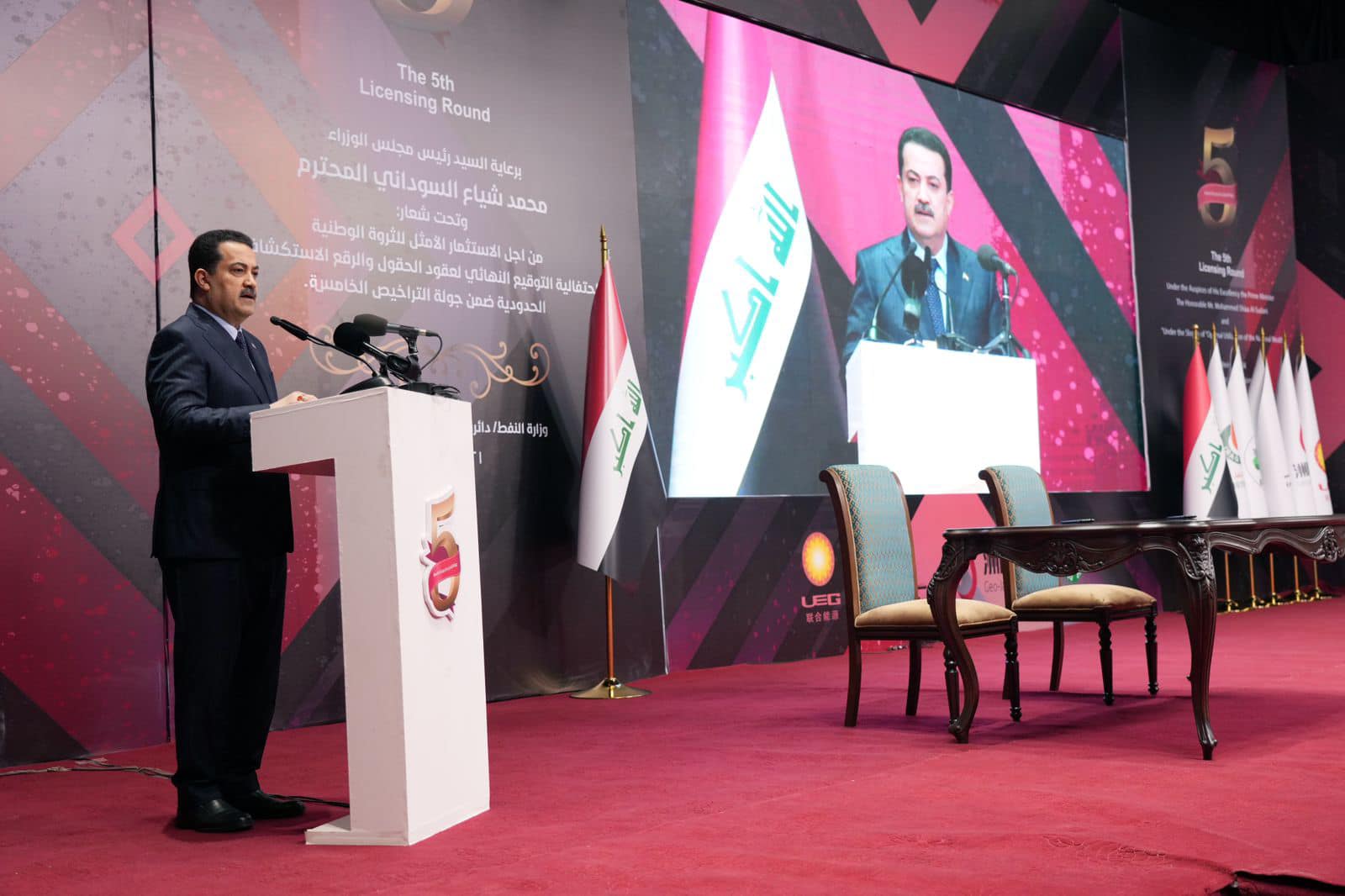Iraq aims to achieve revenues of about 300 billion dollars as a result of the development of border oil fields, whose contracts were signed today, Tuesday, with a number of oil companies.
The signing of contracts for 6 projects in the governorates of Basra and Diyala comes as part of Iraq’s plans to increase production to about 8 million barrels per day by 2027, and to achieve self-sufficiency in gas within 3 years.
Iraqi Prime Minister Muhammad Shia al-Sudani affirmed his country’s endeavor to reach self-sufficiency in gas within 3 years, and to stop imports in order to reduce the burden on the country’s budget.
Contract signing ceremony
Today, Tuesday, February 21 (2023), Al-Sudani sponsored the final signing ceremony for the fifth licensing round to develop a number of border oil fields.
The signing of the contracts comes after the implementation of the fifth licensing round was delayed for 5 years, which caused Iraq great losses and damages.
Al-Sudani stressed that the trend towards investment in associated gas and natural gas stems from a firm conviction, to achieve economic reforms, which are a main focus of the government program.
Development of border oil fields
The fifth licensing round differs from the previous rounds, as it is concerned with developing border oil fields, part of which is shared with neighboring countries, in order to optimally invest the oil and gas resources in those areas and achieve the maximum possible benefit.
Iraq aims to produce about 250 thousand barrels per day of crude oil, and about one billion cubic feet of gas per day from the development of these fields.
The data – seen by the specialized energy platform – revealed that Iraq hopes for the expected production from the fields to reach 4.8 billion barrels of oil equivalent, including 3.581 billion barrels of crude oil and condensate, in addition to 6.947 trillion cubic feet of associated gas.
The Iraqi Ministry of Oil revealed that the expected total revenues from the border oil fields may reach 300 billion dollars, of which the Iraqi government’s share is about 88%, equivalent to 263 billion dollars.
The data showed that the cost of developing the capital and operational border fields in the 6 projects whose contracts were signed will reach about $24 billion, while the profits of the developed companies are estimated at about $13 billion.

Substantial amendments to contracts
The contract of the 5th round is distinguished from the contracts of the previous 4 licensing rounds by strengthening and supporting the contractual and legal aspects, which are primarily in the interest of the Iraqi side.
The contracts adopt a financial system that guarantees the protection of the Iraqi side’s revenues from economic risks by adopting the principle of profit as a percentage and not a fixed number (which was adopted in the previous four rounds), in compliance with the budget laws for the years (2016, 2017, and 2018) that stipulate that contracts include an equation linking between cost recovery and the oil price.
And the Iraqi Ministry of Oil made a number of amendments to the round contracts, ensuring that this model benefits from the advantages of an effective financial system, to share risks with operators, while confirming the Iraqi people’s ownership of all oil and gas, whether stored underground, extracted or source, in addition to not mortgaging any quantities. or property rights of any party other than the Iraqi government.
The recovery of oil costs was also linked to international oil prices to ensure a profitable return for the government in conditions of low oil prices, as the government’s share reaches 70% of the total revenue when the price of a barrel drops to about $22.
The contracts also oblige the developing companies to rationalize their own expenditures and limit them to the requirements of the necessary oil operations by linking their profits to rationalizing spending, controlling development costs, and achieving the planned production rates for each field with the maximum possible efficiency.
The idea of rent has also been introduced into the commercial model of contracts at a rate of 25%, which may stabilize the minimum direct revenues for the Iraqi government during the cost recovery period for the development of border oil fields.
It is scheduled that all deals transferring shares and selling them between qualified companies will be subject to a fee of 35% of the total value of the deal, to be amended in the event of the issuance of a capital tax law, with the contracting company not being allowed to transfer or assign its share of participation in the contract to another company. This company was not qualified by the Ministry of Oil.

Gas self-sufficiency
Al-Sudani said – during the signing ceremony of the fifth licensing round – that the delay in signing contracts for the fifth round, for 5 years, cost the country millions of dollars and negative environmental damage to citizens.
He said, “Reform in the oil sector is the optimal investment of oil wealth, and Iraq’s entry into the global gas market is an option that we planned for and will be implemented,” noting that the anomaly cannot continue with gas burning, which wastes wealth and affects the environment.
He stressed that one of the main reasons for the electricity crisis is the lack of fuel, explaining that his country imports gas at a cost of 10 trillion dinars ($6.85 billion) annually.
He pointed out that his country is working to sign contracts for the construction and investment of refineries, and we will reach self-sufficiency in gas within 3 years to cover all its needs.
He called on the Iraqi Ministry of Oil to work on accelerating the remaining projects from the fifth round, and preparing the sixth round to invest all of Iraq’s patches and fields, whether associated gas or natural gas.
related topics..
Also read..

Leave a Reply